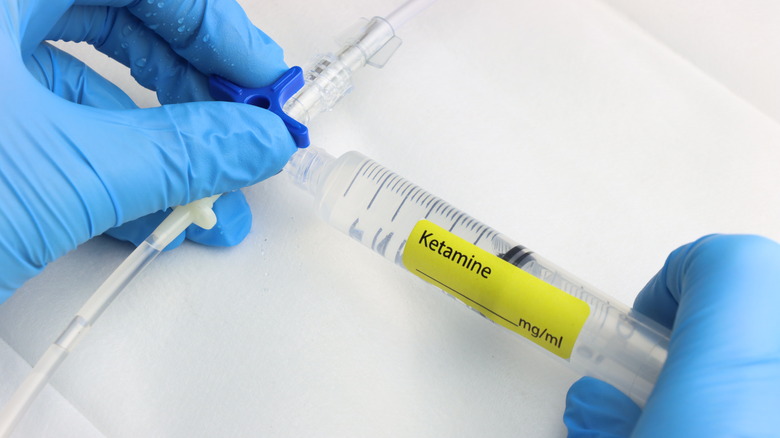Matthew Perry's Cause Of Death Explained
Matthew Perry, best known for playing Chandler Bing on the highly successful sitcom "Friends," recently died at age 54 on October 28 (via People). The LA Times reported the popular actor was found unresponsive in a hot tub at an LA-area home, and authorities noted there was no sign of foul play.
The Los Angeles County Medical Examiner's Office has attributed the late actor's death to "the acute effects of ketamine," a drug he had a history of taking under medical supervision for therapeutic purposes (via TMZ). The medical examiner concluded the drug in his system at the time of his death caused cardiovascular overstimulation and respiratory depression.
Matthew Perry was born on August 19, 1968. His father, John Bennett Perry, was also an actor, and his mother, Suzanne, raised the younger Perry after she and his father separated when he was a baby (via Biography). Perry caught his big break when he was cast as Chandler, and the series went on to win six Emmys and capture the hearts of millions over the 10-year run of the sitcom.
Perry's cause of death attributed to the acute effects of ketamine
Perry's toxicology report revealed that he had received ketamine infusion therapy for his mental health a week and a half before his passing (via TMZ). Experts noted that because the drug has a half-life of approximately three to four hours — meaning the time it takes for half of the drug to work its way out of the body — that infusion dose could not have been related to his cause of death. Half a year before Perry's passing, a new doctor had reduced his frequency of treatment, which had previously been every other day. As previously mentioned, the Medical Examiner determined that Perry had experienced cardiovascular overstimulation and respiratory depression in relation to ketamine.
According to the Cleveland Clinic, respiratory depression occurs when the body isn't taking deep or fast enough breaths and causes an accumulation of carbon dioxide in the blood. Drowning, coronary artery disease, and the opioid treatment drug buprenorphine were also said to have contributed to Perry's death. The toxicology report revealed no signs of alcohol, cocaine, heroin, PCP, fentanyl, or methamphetamine in the actor's system. It was also documented that "The Whole Nine Yards" star was diagnosed with diabetes and emphysema/COPD and smoked two packs of cigarettes daily. However, this was not determined to be related to his death.
What is ketamine therapy?
Low-dose injections of the dissociative drug ketamine have been used for patient treatment of post-traumatic stress disorder (PTSD) and treatment-resistant depression under in-clinic physician supervision, explains Harvard Health Publishing. Treatment-resistant depression is defined as severe depression in which no other interventions have been successful in alleviating symptoms. The drug works by blocking a specific receptor in the brain that plays a role in mood, cognition, and pain (via Pacific Neuroscience Institute).
Ketamine's fast-acting psychedelic effects put the patient in a state of altered consciousness. This is followed by an "afterglow" period, which may last for a series of days or weeks. In the long run, the effects of ketamine therapy are said to include boosts in mood, motivation, insight, and behavior. Some patients have voiced experiencing symptom relief within hours of treatment. Side effects may include dizziness, headache, dissociation, intoxication, nausea, high blood pressure, and more.
Ketamine treatment is not for everyone and may not be suitable for those with a history of certain psychotic disorders or substance use disorders, as the drug can be addictive. Matthew Perry had shared his experience with substance use disorder with the public over the years and had plans to create a foundation before his untimely death, reported People. Shortly after his passing, the Matthew Perry Foundation was established to support others looking for help in managing addiction (per NPR).



